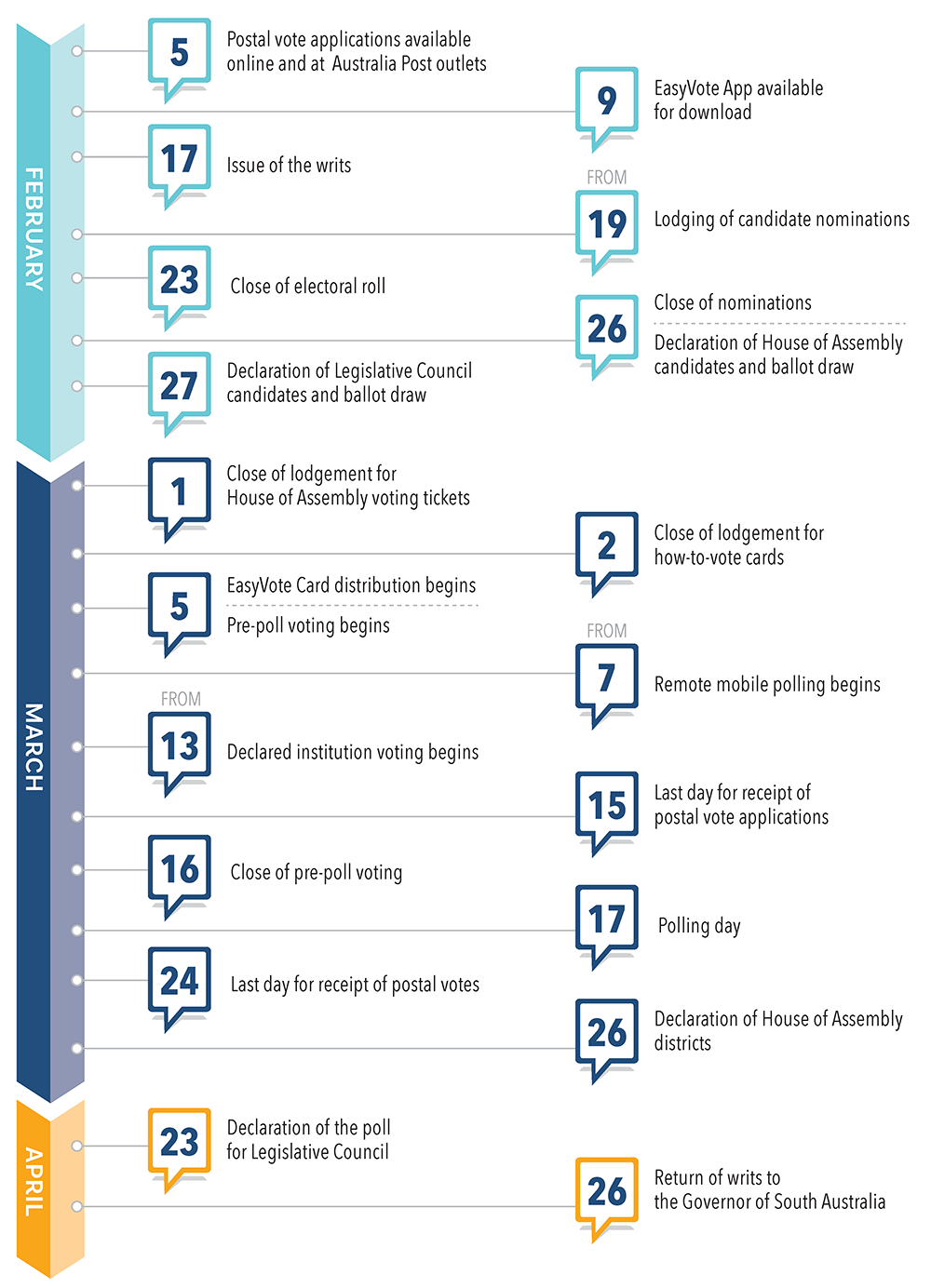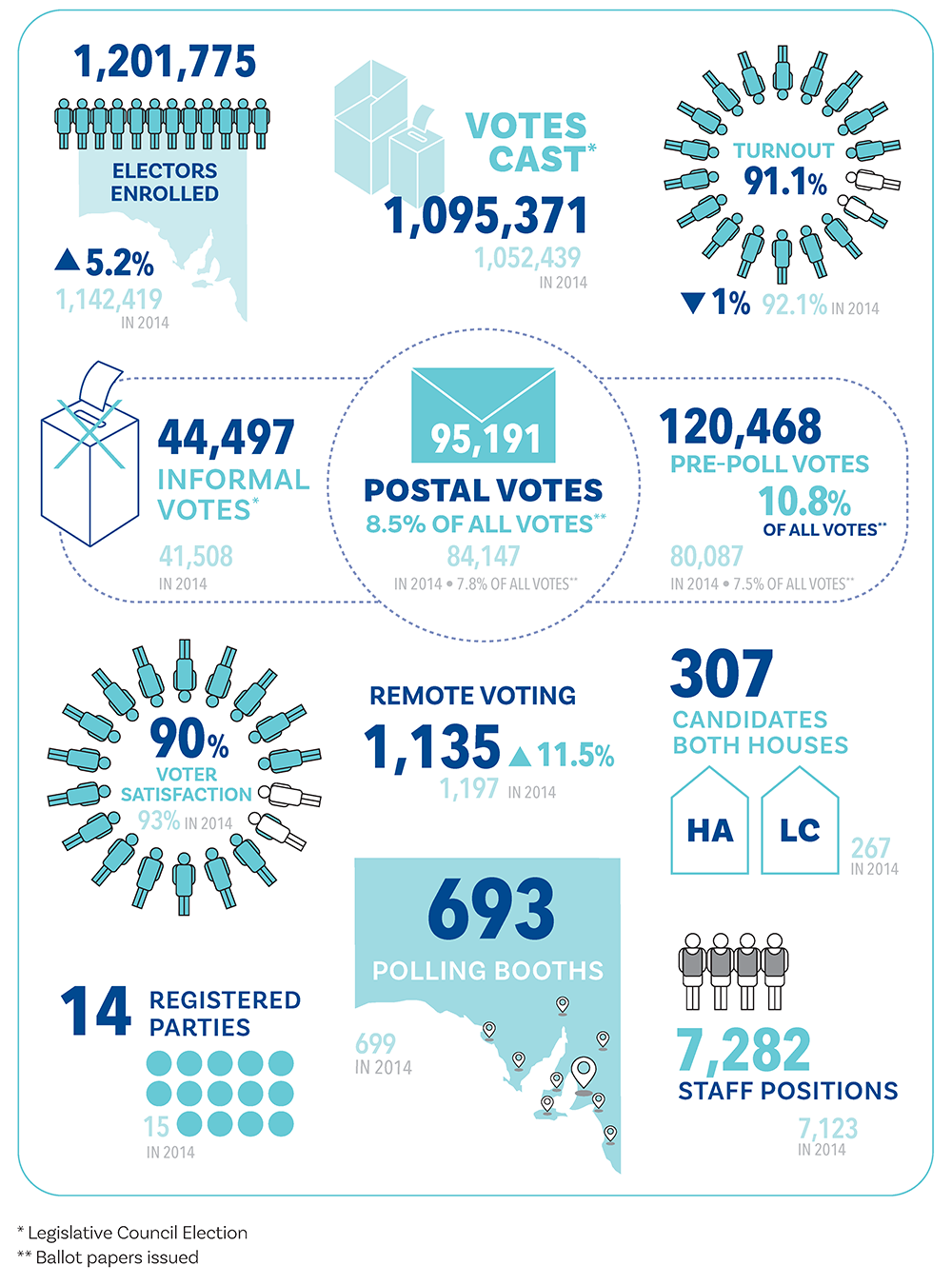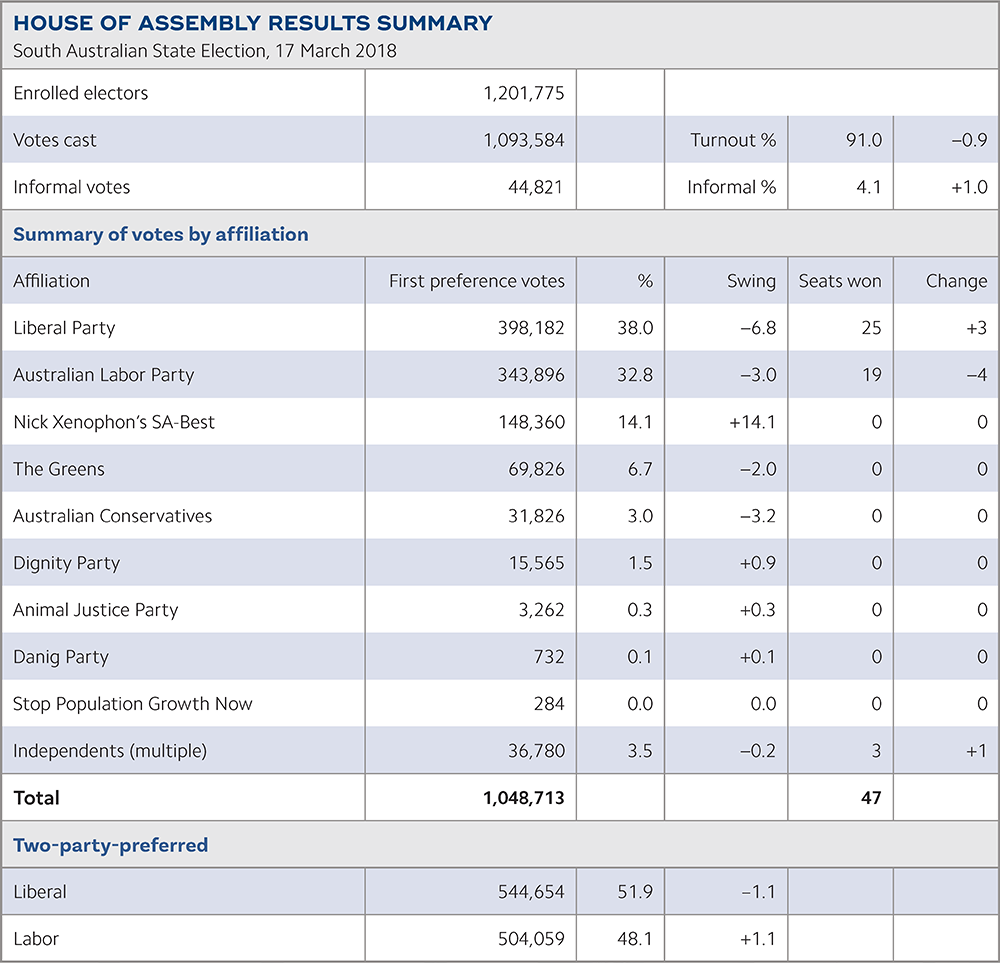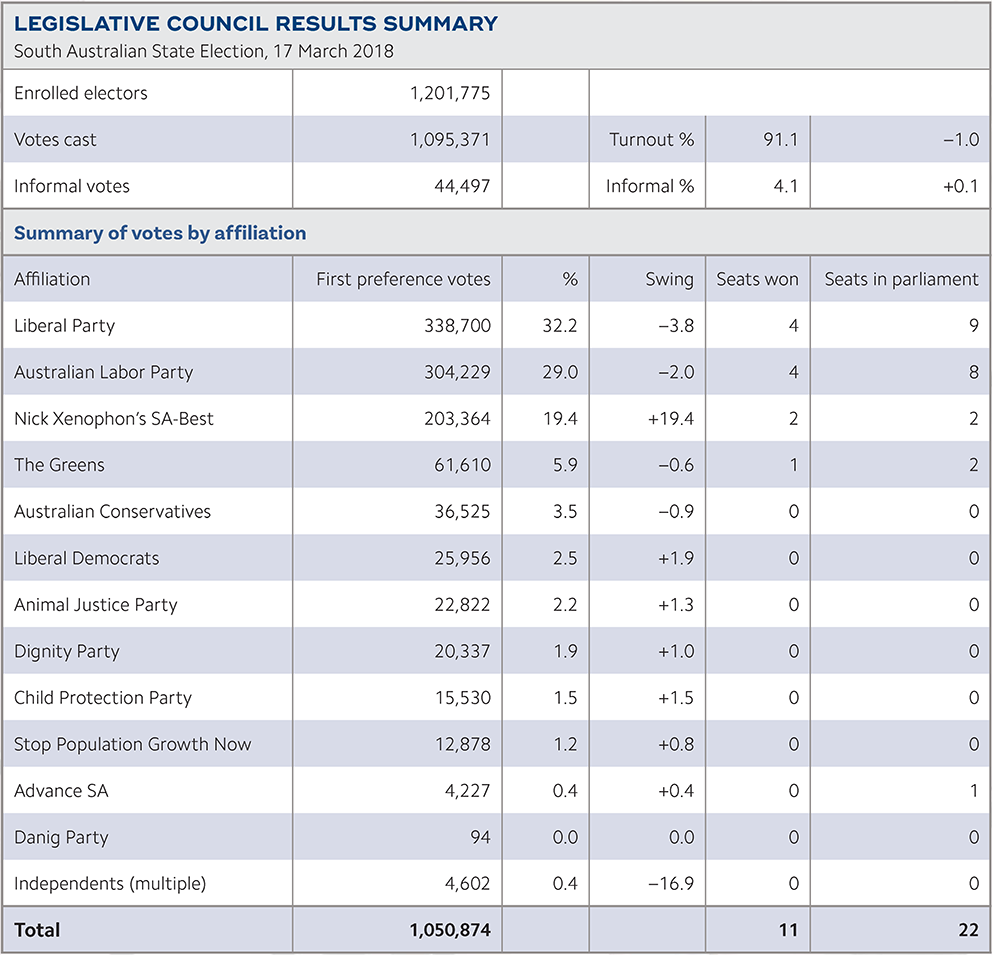Message from the Electoral Commissioner

In March 2018 South Australian electors voted to elect their representatives for the 54th Parliament of South Australia.
At the conclusion of the Election the Liberal Party won 25 seats in the House of Assembly and formed government. The Australian Labor Party won 19 seats, with independent candidates winning the remaining three seats. In the Legislative Council election, the Liberal and Labor parties each won four seats, Nick Xenophon's SA-Best won two seats, while The Greens took one seat.
The 2018 State Election was noteworthy for the significant changes to the electoral environment that both the Electoral Commission of South Australia (ECSA) and the 1.2 million South Australian electors were required to navigate.
Perhaps the most significant of these changes was the largest redistribution of electoral boundaries in recent history. Another major change was the introduction of optional preferential voting for the Legislative Council, and the associated need for ECSA to introduce scanning technology to manage the complexity of counting Legislative Council ballot papers.
One of my major priorities as Electoral Commissioner was ensuring every eligible elector was supported to vote regardless of their location or circumstance. In the months leading up to the Election, many hours and resources were devoted to consulting with stakeholders and using their feedback to design accessible information and voting services. I am particularly proud of our efforts in this regard and the outcomes we achieved. Notable examples include consulting and partnering with a range of community organisations to design and distribute targeted information and services, as well as enfranchising electors in the APY Lands which resulted in increased enrolments and 18% more votes collected. I also note the trial of VoteAssist in partnership with the Royal Society for the Blind, which was the first ever special voting service for blind and low vision electors offered at a South Australian election.
In line with our State Election Service Charter, we sought to give electors confidence in our commitment to high-quality election service delivery and electoral integrity. I am pleased that most targets were met or exceeded, including 96.9% of all eligible South Australians enrolled. The overall elector satisfaction rating was 90% with 96% of electors satisfied with their voting experience on polling day.
Despite these successes, I recognise that there are a number of areas for improvement in the way that ECSA conducts state elections.
Indeed, much of the electoral legislation that sets out how ECSA must conduct elections has remained unchanged for decades. And while our reliance on tried and tested ways of doing things has allowed us to continue to deliver successful state elections, this has resulted in South Australia failing to keep pace with the electoral modernisation that has occurred in other jurisdictions. It is now well overdue for South Australia to modernise its electoral act and allow voting services to evolve in order to meet changing community expectations. Our electoral system must adapt and integrate technology to better reflect the digitally-connected environment we live in in the 21st century.
This Report contains 16 major recommendations for legislative change that cover a wide range of areas and that will, if actioned, deliver the electoral modernisation and reform that South Australia requires. To summarise some of the key themes and priorities of these recommendations, we must:
- Recognise the exponential growth in the number of South Australians who want to vote early and - like other jurisdictions around Australia - accommodate this preference for convenience voting by expanding our pre-poll voting services and removing the eligibility requirements for voting early. I recommend too that most pre-poll votes be issued as ordinary votes, so that ECSA can count ballot papers sooner. Without these changes, it is likely that election results will not be known for many days after polling day.
- Modernise our voting services to better accommodate the realities of modern society and continue to enfranchise all electors, including those unable to access a polling booth, those living in remote areas of the state, in prison, and those travelling interstate or overseas. Major changes are required to overhaul our approach to postal voting and to introduce mobile voting teams in metropolitan areas.
In addition to these 'Calls for legislative change', you will also note throughout this Report a number of sections titled 'Modernising electoral services'. Although these innovations do not require legislative change, they represent substantial improvements to how we conduct elections and would require additional funding to achieve. They include:
- Full electronic roll mark-off at every polling booth, and printing House of Assembly ballot papers on demand at pre-poll voting centres. This will reduce queue waiting times, the potential for multiple voting and the incidence of polling official error.
- Opening a pre-poll centre in every House of Assembly electoral district and expanding opening hours to accommodate electors who work or whose commitments prevent them from voting during normal business hours.
- An ongoing education campaign aimed at young people and new electors to counter the declining levels of participation, formality and youth enrolment.
I note that while each of these would be exciting and valuable innovations for South Australia, all have been successfully adopted by other jurisdictions.
ECSA's annual budget per elector is by far the lowest of any electoral commission in Australia and our ongoing staffing level is considerably lower than our closest equivalent, the Western Australian Electoral Commission. As argued within the Report, ECSA must ensure it has sufficient resources, staffing capacity, expertise and the best possible organisational structure to meet the challenge of running elections in a sustainable manner and deliver the program of modernisation outlined in this Report.
As a final note, I wish to thank all the people and organisations that contributed to the 2018 State Election. These include ECSA staff and our thousands of polling officials, but also many stakeholders such as community organisations, government agencies, candidates, party officials, registered officers, suppliers, and other electoral commissions. I express my sincere gratitude for your role in the Election's success.

Mick Sherry
ELECTORAL COMMISSIONER
Election timeline

Election highlights

Results of the Election


Recommendations for legislative change
This Election Report includes a number of recommendations for consideration by the Parliament of South Australia. The context and reasons for each of these recommendations can be found throughout the Report in break-out sections titled 'A call for legislative change'.
Recommendation 1.
Enrolment up to and on polling day
s32B
That the Electoral Act (1985) (the Act) be amended to
enable eligible electors to enrol up to and on polling
day. After claiming enrolment, these electors would
be allowed to cast declaration votes which would
not be admitted to the count until an enrolment
investigation had been satisfactorily completed in
the week after polling day. Read more.
Recommendation 2.
Compulsory voting exemption
for itinerant electors
s85
That the Act be amended so that itinerant electors
are exempted from compulsory voting at state
elections. Read more.
Recommendation 3.
Enrolment of
itinerant electors
s31A
That the
Act be amended to avoid inconsistency
with the Commonwealth Electoral Act (1918), so
that itinerant electors who fail to vote at a state
election, or who remain outside South Australia
for a continuous period of more than one month,
continue to be entitled to be enrolled as itinerant
electors. Read more.
Recommendation 4.
Online portal for candidate lodgements
s53, s53A, s54
That the Act be amended to prescribe a method
for the electronic lodgement of nominations,
voting tickets and how-to-vote cards to enable more
accurate, timely and robust mechanisms that assist
and support parties and candidates with meeting
legislative obligations. Read more.
Recommendation 5.
Public notices
s18, s41, s48, s49, s77
That the Act be amended to remove the obligation
for the Electoral Commissioner to publish public
notices by advertisement in a newspaper circulating
generally throughout the state, so that notices can
instead be published on ECSA’s website or by any
other means the Electoral Commissioner deems
appropriate. Read more.
Recommendation 6.
Postal vote applications
s73, s74, s91
That the Act be amended to remove the requirement
for postal vote applications to be by letter and to
bear the signature of the elector, so that a secure
method can be implemented to allow electors to
apply for postal votes online and by telephone with a
form of identification that can ensure the validity of
the returned votes. Read more.
Recommendation 7.
Postal voting timeframes
s74, s82, s91
That the Act be amended to modify the timeframes
for postal voting, bringing forward the deadline to
apply for a postal vote from 5pm on the Thursday
prior to polling day to:
i. 5pm on the Tuesday prior to polling day for
applications from South Australian locations;
and
ii. 5pm on the Friday eight days prior to polling
day for applications from interstate and
overseas locations.
Read more.
Recommendation 8.
Electronic postal voting
s74
That the Act be amended to allow ECSA
to replace long-distance postal voting for electors overseas, in
non-metropolitan interstate locations, as well as remote
locations of South Australia, with a robust and secure system
for the electronic delivery and return of ballot papers. Should
this recommendation be agreed Recommendation 7(ii) would not be
required. Read more.
Recommendation 9.
Postal voting for prisoners
reg
9A
That the Electoral Regulations (2009) be amended so
that a reason of a prescribed nature allows an eligible
resident of any correctional institution to make a
declaration vote by post.
Read more.
Recommendation 10.
Register of declaration voters
s73, s74
That the Act be amended to change the name
‘registered declaration voter’ to ‘general postal
voter’ and to harmonise the eligibility criteria of the
registered declaration voter program with the criteria
of the Commonwealth general postal voter program.
Read more.
Recommendation 11.
Eligibility criteria for pre-poll voting
s71
That the Act be amended to remove eligibility criteria
for pre-poll voting to allow any enrolled elector to opt
for convenience voting at a pre-poll voting centre in
the fortnight prior to polling day.
Read more.
Recommendation 12.
Encouragement of voting on polling day
s8
That the Act be amended to remove the direction
for the Electoral Commissioner to encourage the
casting of votes at a polling booth on polling day.
Read more.
Recommendation 13.
Issue of ordinary votes at pre-poll centres
s71
That the Act be amended so that ordinary votes may
be issued at pre-poll voting centres located within
the elector’s own district.
Read more.
Recommendation 14.
Mobile polling
s77
That the Act be amended to remove references
to places within a remote subdivision to allow the
Electoral Commissioner to establish mobile polling
booths at any location in the state which he or she
deems appropriate.
Read more.
Recommendation 15.
Declared institutions
s83
That the Act be amended to abolish section 83
concerning declared institutions and electoral
visitors, which will be replaced instead by mobile
polling teams able to visit and take votes at any
location which the Electoral Commissioner deems
appropriate. Read more.
Recommendation 16.
Scrutiny of ordinary pre-poll votes
s89
That the Act be amended to allow
the scrutiny to commence before the close of polling so that
ordinary votes cast at pre-poll voting centres (if
Recommendation 13 is taken up by Parliament) can be scrutinised
and counted on polling day under suitably tight security
conditions to guarantee the secrecy of the count until after the
close of poll. Read more.
Recommendations from the 2014 Election Report
Following the 2014 State Election, ECSA made a number of recommendations for legislative change which were not acted upon. ECSA is of the view that some of those recommendations remain necessary for the improved administration of elections and requests that Parliament give them further consideration.
Recommendation 1.
Staff
s12
Provide for the setting of a scale of fees and
allowances to be fixed by the Electoral Commissioner
based upon the relevant public sector award rather
than by the Minister.
Recommendation 2.
Printing of rolls
s25
That the Act be amended to remove this section
or delete reference to ‘or the Minister so directs’ as
the rolls are available in electronic form and prepared
for close of rolls for any relevant election.
Recommendation 9.
Properly staffed polling booths to be provided
for districts
s65
That the Act be amended to provide the Returning
Officer with the ability to establish a polling booth
at each polling place ‘for’ the district rather than
‘within’ the district to allow for the establishment
of polling booths outside the district. This will assist
with polling for a by-election when a suitable polling
location may exist outside of the designated district.
Recommendation 10.
Preparation of certain electoral material
s66
That the Act be amended so that how-to-vote cards
submitted by candidates be required to be in a form
prescribed by regulation. This will provide clarity and
standardise design.
Recommendation 11.
Distance eligibility criteria
s71
That the Act be amended to change the distance
qualification criteria from 8 to 20 kilometres so that
all electors entitled to apply for a declaration vote
meet the same distance qualification, as previously
altered for those seeking inclusion on the register
of declaration voters.
Recommendation 25.
Limitations on size of electoral advertisements
s115
That the Act be amended to remove limitations on
the size of electoral advertisements.
Recommendation 30.
Injunctions
s132
That the Act be amended so that injunctive relief
may be sought in relation to contravention of,
or non-compliance with, all of Division 2 of Part 13,
including special provisions relating to how-to-vote
cards under s112A, where a person may distribute a
how-to-vote card in breach of the requirements.